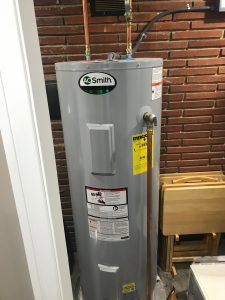Dealing With Standard Heater Malfunctions
Dealing With Standard Heater Malfunctions
Blog Article
We have stumbled on this article relating to Common Problems with Tank Water Heaters listed below on the internet and figured it made sense to discuss it with you on this site.

Imagine beginning your day without your routine warm shower. That already establishes a poor tone for the remainder of your day.
Every home requires a reliable hot water heater, but just a few recognize exactly how to take care of one. One easy method to maintain your water heater in top form is to look for faults frequently and also fix them as soon as they appear.
Keep in mind to shut off your hot water heater before sniffing around for mistakes. These are the hot water heater faults you are more than likely to come across.
Water as well warm or also cool
Every hot water heater has a thermostat that figures out just how warm the water obtains. If the water entering your home is as well hot in spite of setting a convenient maximum temperature level, your thermostat could be malfunctioning.
On the other hand, as well cold water may be due to a fallen short thermostat, a damaged circuit, or incorrect gas flow. As an example, if you utilize a gas water heater with a busted pilot light, you would certainly obtain cold water, even if the thermostat is in best condition. For electrical heating units, a blown fuse might be the offender.
Not enough warm water
Water heaters been available in many sizes, relying on your hot water needs. If you lack hot water before every person has had a bath, your hot water heater is also small for your family size. You ought to take into consideration installing a larger hot water heater storage tank or selecting a tankless water heater, which uses up less space and also is extra long lasting.
Odd noises
There are at the very least 5 type of noises you can learn through a hot water heater, however the most usual interpretation is that it's time for the water heater to retire.
First off, you must be familiar with the regular appears a water heater makes. An electrical heating unit may seem different from a gas-powered one.
Popping or banging audios normally indicate there is a piece of sediment in your containers, and also it's time to cleanse it out. On the other hand, whistling or hissing audios might just be your shutoffs letting some pressure off.
Water leaks
Leaks could originate from pipelines, water connections, valves, or in the worst-case circumstance, the container itself. Gradually, water will corrode the container, as well as find its escape. If this happens, you require to replace your hot water heater asap.
However, prior to your change your entire container, make sure that all pipelines are in location which each valve functions perfectly. If you still require aid determining a leakage, call your plumber.
Rust-colored water
Rust-colored water means one of your water heater elements is rusted. It could be the anode rod, or the storage tank itself. Your plumber will be able to determine which it is.
Lukewarm water
No matter how high you established the thermostat, you will not obtain any type of hot water out of a heater well past its prime. A water heater's performance might minimize with time.
You will also obtain lukewarm water if your pipes have a cross link. This implies that when you turn on a tap, hot water from the heating unit moves in together with regular, cold water. A cross connection is very easy to area. If your warm water faucets still follow closing the water heater shutoffs, you have a cross link.
Discoloured Water
Corrosion is a significant cause of filthy or discoloured water. Deterioration within the water container or a failing anode pole could cause this discolouration. The anode pole secures the tank from rusting on the within and must be checked yearly. Without a pole or a correctly operating anode rod, the hot water promptly corrodes inside the storage tank. Call a professional water heater professional to determine if replacing the anode rod will take care of the trouble; otherwise, change your hot water heater.
Conclusion
Ideally, your water heater can last 10 years before you need a change. However, after the 10-year mark, you might experience any one of these mistakes a lot more consistently. Now, you need to include a new water heater to your spending plan.
How To Troubleshoot 3 Common Water Heater Problems in Twin Cities
The Water Heater Is Leaking
A leaky cold water inlet valve A loose pipe fitting A leaky temperature and pressure relief valve A corroded anode rod A cracked tank Turn Off Your Water Heater:
Shut off your gas water heater by turning the gas valve on the unit to the “OFF” position. Shut off your electric water by switching its power off at your electrical panel. Look for a two-pole breaker labeled “water heater” and turn it to the “OFF” position. Move the ball valve connected to the water heater to be perpendicular to the piping at a 90° angle. Look for the Leak:
Depending on whether the water is coming from the tank's top or bottom, you’ll want to look for the leak in different locations.
If the leak comes from the top of the tank, carefully look for water escaping from the cold water inlet valve or loose pipe fittings. Rusted hot and cold water valves can have loose connections with the tank, with water leaking out of them.
https://mspplumbingheatingair.com/blog/how-to-troubleshoot-3-common-water-heater-problems
As a fervent reader about Water Heater Repair and Troubleshooting, I imagined sharing that portion was a good idea. Appreciated our write-up? Please share it. Let another person check it out. Thanks so much for your time invested reading it.
Booking Page Report this page